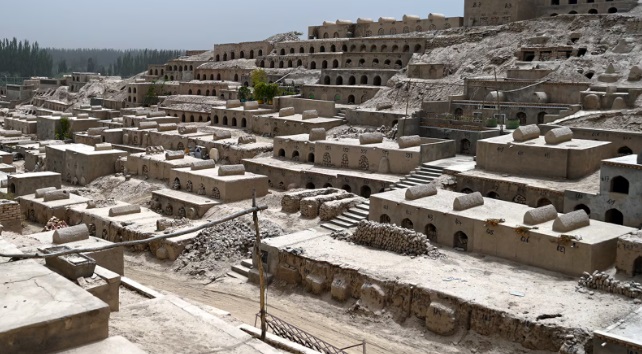A Uyghur cemetery in Yengisar county, Kashgar prefecture, in northwestern China's Xinjiang region, July 19, 2023. (Pedro Pardo/AFP)
They say the international community must act now to hold Beijing accountable for atrocities in Xinjiang.
Three years ago, an independent tribunal in London determined that China had committed crimes amounting to genocide against Uyghurs and other Turkic Muslims in its far-western Xinjiang region.
Though the tribunal’s Dec. 9, 2021, ruling was non-binding, it served as a clarion call to hold the Chinese government accountable for rights violations in Xinjiang, which Beijing has repeatedly denied.
Since then, global recognition of the Uyghurs' suffering has grown, though little progress has been made in actually bringing China to justice.
“Uyghur Genocide Recognition Day is a reminder of what is at stake — Uyghurs continue to face cultural erasure,” Omer Kanat, executive director of the Uyghur Human Rights Project, or UHRP, said in a statement. “Words of recognition must be backed by concrete, enforceable policies to end complicity in these atrocities.”
The Chinese government’s repression includes mass arbitrary detentions, forced labor, family separations, religious persecution and the erasure of Uyghur identity and culture, the group said.
It urged governments to enforce import bans on goods produced with Uyghur forced labor, tighten sanctions against Chinese officials responsible for human rights abuses and take steps to end the genocide. It also appealed to companies to end business relationships with entities linked to forced labor.
‘Silence is complicit’
In Geneva, Switzerland, members of the World Uyghur Congress, or WUC, rallied in front of U.N. headquarters on Monday, demanding that the body hold China accountable, while calling on Beijing to stop the atrocities.
WUC’s Youth Committee called for action on Dec. 9 to remind the international community to break its silence and take action now against the Uyghur genocide, saying that “silence is complicit” in a social media campaign.
In January 2021, the U.S. government declared that the abuses in Xinjiang amounted to genocide and crimes against humanity — but many governments have not, although more than 10 Western parliaments have done so.
“The duty of governments such as the United Kingdom government to decide whether genocide has happened has been avoided by the British government and by many other governments for a range of dishonest reasons,” Geoffrey Nice, prominent U.K. attorney and chair of the Uyghur Tribunal, told Radio Free Asia.
“Therefore, they have not reacted to the genocide by accepting that it happened and doing something, and that’s a major shortcoming,” he said.
Genocide Convention
Monday also marked the 76th anniversary of the adoption of the U.N. Genocide Convention, and the International Day of Commemoration and Dignity of the Victims of the Crime of Genocide and of the Prevention of this Crime.
China has ratified the U.N. Genocide Convention, so that it is legally bound by the document’s provisions, though there have been concerns about the country’s compliance with the convention, especially regarding the treatment of Uyghurs in Xinjiang.
“Today is a stark reminder of the ongoing human rights abuses endured by the Uyghur people and our failed promises under the Genocide Convention,” Rushan Abbas, executive director of Campaign for Uyghurs, said in a statement.
“The independent tribunal confirmed the CCP’s genocide and underscored the urgency to act,” she said, referring to the Chinese Communist Party. “Such determination and awareness require actions to drive meaningful change. Failing to do so undermines the Convention and our commitment to ‘Never Again.’”
“The international community must move beyond rhetoric and take concrete steps to end China’s ongoing Uyghur genocide,” Abbas said.
RELATED STORIES
Interview: Uyghur Tribunal verdict ‘rested on a lot of evidence’
Uyghur Tribunal finds China committed genocide in Xinjiang
Uyghur Tribunal hears grim accounts of rape and torture in China’s Xinjiang
Uyghur Tribunal determination could change paradigm for China relations: experts
UN Human Rights Council
This fall, Michèle Taylor, U.S. ambassador to the U.N. Human Rights Council, presented a joint statement calling on China to work with the Office of the High Commissioner to implement the recommendations from a 2022 report documenting serious human rights concerns in Xinjiang. The report concluded that Beijing’s actions “may amount to crimes against humanity.”
“Two years on, the PRC still refuses to acknowledge the findings of the report and continues to deny the truth about China, and the United States has not forgotten,” Taylor said, referring to the People’s Republic of China. “We will not forget the desperate human rights situation faced by Uyghur Muslims.”
Taylor made the comments during a Monday screening in Geneva of the documentary “In Search of My Sister” about Abbas’s quest to free her sister, a medical doctor serving a 20-year jail sentence in Xinjiang likely in retaliation for Abbas’s advocacy with her rights group.
“We have many tools at our disposal on the Human Rights Council, and it is imperative that we call out injustice wherever it may be,” Taylor said. “No country is above scrutiny.”
Additional reporting by Jilil Kashgary. Edited by Malcolm Foster.

